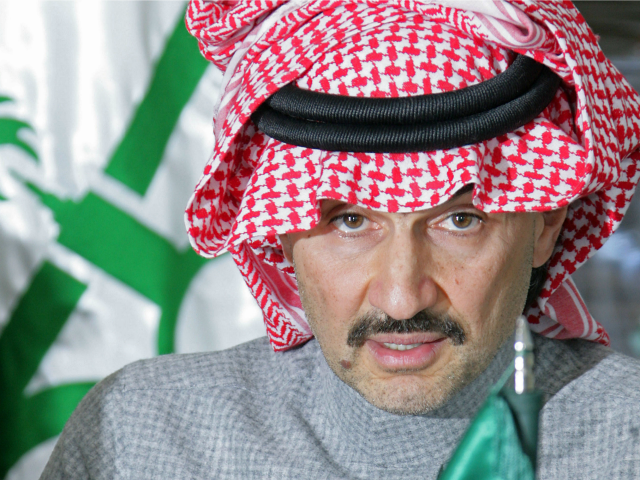Two months after a sweeping series of arrests and temporary detentions made in connection with Saudi Crown Prince Mohammed bin Salman’s corruption probe, the fate of perhaps the biggest fish caught in the net remains uncertain: Prince Alwaleed bin Talal, one of the wealthiest, most famous, and well-connected men in the world.
Most of the detainees were released from their often remarkably luxurious quarters after about a month, and a sizable amount of the money allegedly lost to corruption has been recovered in a string of enormous settlements, a few of them approaching nine figures. But Prince Alwaleed, who the L.A. Times observes is “the public face of the Saudi royal family to many foreign executives and investors,” is still twisting in the wind.
“People with knowledge of the matter say Alwaleed is balking at demands that could see him relinquish control of Kingdom Holding Co,” L.A. Times and Bloomberg News report. “He also is resisting any suggestion of wrongdoing because of the impact it would have on his reputation, they said. The prince owns the vast majority of the $9-billion conglomerate, which has stakes in household names from Citigroup Inc. to Twitter.”
Alwaleed is a crucial case because the ostensible purpose of the massive corruption crackdown was to make Saudi Arabia a more stable, open, and attractive home for foreign investment—a crucial component of Crown Prince Mohammed’s “Saudi Vision 2030” program to transition the Kingdom away from an oil-based economy.
The alternative and far more cynical interpretation of the crackdown is that MBS, as he is widely known, was simply trying to consolidate power and claw back a hundred billion dollars frittered away by profligate royals during the heyday of Saudi oil. If Prince Alwaleed’s case drags on, even though it makes foreign investors palpably nervous, it will lend credence to the cynical view in many eyes.
The L.A. Times floats a third possibility: the cratering oil market and regional tensions caused the clock to run out much sooner than Saudi reformers anticipated when the Saudi Vision 2030 plan was formulated, and they had to act very quickly to restore the national treasury and cleanse the government of corruption. MBS and his advisers may have concluded that short-term instability was an acceptable price to pay for executing long-term reform faster than they wanted to, or that shock and awe is the only way to reform a system with as much financial, political, and cultural inertia as the Kingdom of Saudi Arabia.
Alwaleed definitely lives well, but he also plowed Saudi money into investments with a great many partners and employees. The largest settlement known to have been paid for corruption charges so far was the billion dollars tendered by the highest-ranking detainee, the late King Abdullah’s son Prince Miteb. According to the Wall Street Journal, Saudi authorities are demanding six times as much from Prince Alwaleed. That would amount to fully a third of his personal holdings and business empire. The global economic shockwaves from such a settlement would be huge.
CNBC reported in early December that there are conflicting accounts of how Alwaleed has been treated in detention. He is ostensibly cooling his heels in a house-arrest situation at the Ritz Carlton in Riyadh along with many other royals whose cases have not yet been resolved, but “several credible reports have surfaced that bin Talal and the others are being tortured.”
CNBC found it curious that Alwaleed’s high-profile partners and friends—a roster of global celebrity billionaires including the likes of Rupert Murdoch and Bill Gates, plus a fair number of prominent Western politicians—have not spoken up more loudly in demanding his release.
A big part of the answer is the looming sale of stock in Saudi Aramco, the national oil company. Even in today’s glutted oil market, it will easily be the biggest IPO of all time. It is not just that everyone is clamming up because they want a slice of that titanic financial pie; it is that everyone understands the Aramco sale will be a crucial component of Saudi Arabia’s transformation.
Financial planners and regional strategists alike are hoping Saudi Arabia will liberalize because it has concrete reasons for doing so—about $2 trillion of them, given the projected sale price of Aramco stock. Destroying that value and ruining the Saudi Vision 2030 plan could destabilize the country and region further, with little hope of long-term gain. The question is how much latitude the rest of the world is willing to give MBS to finish what he started with his corruption crackdown.
Minister of State Ibrahim al-Assaf returned to work on Tuesday, attending a cabinet meeting after weeks in detention. Crown Prince Mohammed bin Salman was also at the meeting. Bloomberg Politics notes that Assaf did not smile for the photograph taken afterward. The expression on Prince Alwaleed’s face when he finally checks out of the Ritz Carlton will tell us something about where Saudi Arabia is headed.

COMMENTS
Please let us know if you're having issues with commenting.